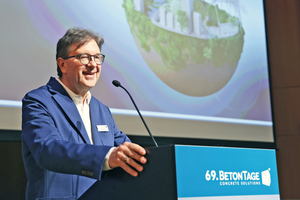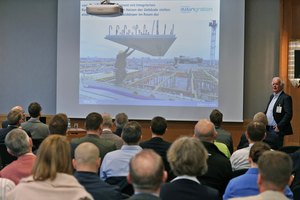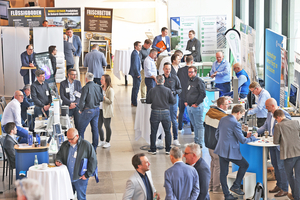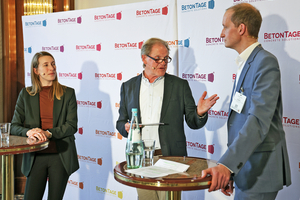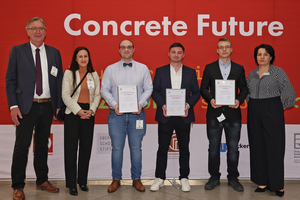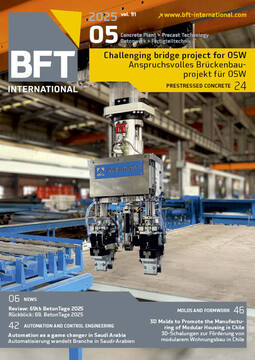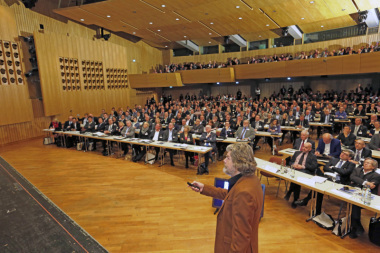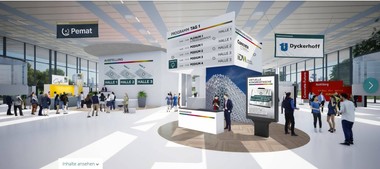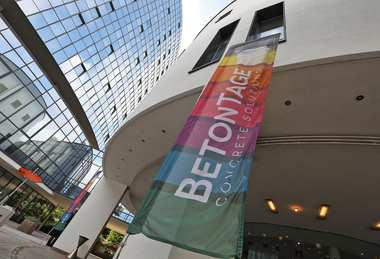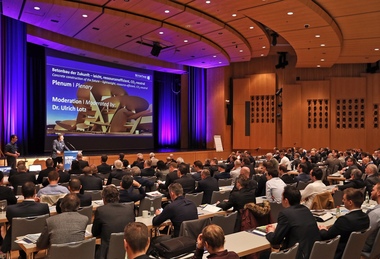69th BetonTage provided valuable impetus for the precast industry
The transformation of the construction industry is already well underway. The cement and concrete industry, in particular, is working hard to minimize its ecological footprint on its way to decarbonization, circular economy and digitalization. This was impressively demonstrated at the 69th BetonTage in Ulm from 11 to 13 March 2025. With its top-class program, highly realistic exhibitions and interdisciplinary dialog, it once again emphasized its relevance as the leading congress of the precast industry. Around 1,500 visitors used the platform for an intensive exchange of knowledge and experience.
Trend-setting presentations on building today and tomorrow
Under the motto „Rethinking Sustainability,“ the event offered numerous lectures, panel discussions and practical demonstrations on all aspects of building with concrete components. Prominent speakers from research and practice, start-ups and committed leading players in the industry spoke at the event, as did key figures from the materials side, including suppliers of cement, alternative binders and products from concrete chemistry. They all examined the current challenges and provided information on pioneering technologies and developments.
Trend-setting lectures on building, today and tomorrow
“The motto of our congress this year means that sustainability goes beyond reducing CO2 emissions. It stands for longevity, energy efficiency, storage capability, affordability and climate protection,” explained Dr. Ulrich Lotz, organizer of the BetonTage, in his opening address to the congress. This objective was reflected throughout the entire technical program. The agenda included such topics as resource-preserving and greenhouse-gas-reducing protection processes for circular building, the use of R concrete and reusability of concrete components. At the same time, reports were presented on innovative products such as thin-walled precast floor slabs, textile-reinforced cast-stone slabs, in addition to multifunctional and energy-optimized system building components. Lectures on serial and modular building with concrete components were also part of the program. They demonstrated how, in times of housing shortage, affordable living space can be quickly created. Using the example of the Siemens Campus in Erlangen, Germany, insights were also presented on the benefits of greenhouse-gas-oriented invitations to tender.
Other topics were digital methods for planning, construction and implementation of buildings, additive production as well as AI-supported evaluation and maintenance of construction works. Numerous contributions demonstrated innovative approaches especially involving the optimization of materials and structures – two important levers for preservation of resources. The topics included the use of modern, CO2-reduced cement and concrete types, such as those using alternative binders and reinforcement. Further discussions in this context included topics on the assessment of sustainability of concrete structures, feasible unified and cost-efficient standards for providing verification as well as the role of standardization. The new trend-setting Directive “Greenhouse-gas-reduced Structures Made of Concrete, Reinforced Concrete and Prestressed Concrete,” prepared by the German Committee for Reinforced Concrete, was presented in the panel for structural engineers.
Transfer of knowhow in time-tested collaboration
The program of the BetonTage reflected the entire bandwidth of the precast industry and the diversity of its products. Input for the panels was also provided by the professional associations Fachvereinigung deutscher Betonfertigteilbau e. V., Bundesverband Leichtbeton e.V., Betonverband Strasse, Landschaft, Garten e. V,. as well as the Informationsgemeinschaft Betonwerkstein Info-b e. V. and the Syspro-Gruppe Betonbauteile e. V. The panel on all aspects of fiber-based multi-material lightweight construction was once again organized by Composites United e. V.
The 1st German Infrastructure Day, to which the organizer had invited the association Bundesfachverband Betonkanalsysteme e. V., was also a success. This event examined pioneering projects and sustainable concepts for canal and underground engineering. Around 160 persons participated here, from manufacturing companies, planning consultants and the public-authorities sector.
The Future Day Construction was held for the sixth time in collaboration with the construction interest group Bauwirtschaft Baden-Württemberg. Following an update on the activities of the Solid Unit – the network on innovative structural engineering – the contributions examined a range of the fields of action for CO2 reduction and resource preservation that can contribute to transformation of the industry. In addition to innovations by startups, the focus was on topics such as lifecycle perspectives for buildings, building with Type E and optimization of tendering processes.
Rethinking construction planning: a bolder approach for using innovations
The comprehensive technical program of the BetonTage vividly illustrates the great diversity of possibilities for meeting the requirements of climate protection beginning today. This was one of the topics in the press conference. “It is essential to apply these possibilities in practice as well, and to create a market in which innovations can be quickly and efficiently applied,” as urgently emphasized by Prof. Dr.-Ing. Michael Haist, Head of the Institute for Building Material at Leibniz University in Hannover and Chairman of DAfStb. To achieve this, we must provide the normative and legal prerequisites.
His dialog partner, Dr. Stefanie Weidner of the company Werner Sobek AG, also made an appeal to remove the obstacles to new technologies. “Sometimes there is simply a lack of courage in this country,” she said, as she stressed the importance for rethinking in construction planning. “Consideration of emission limits in invitations to tender would be one way for achieving more sustainable construction methods,” she said and referred to her experience in Denmark, where this was already legally established.
Less optimistic was the statement on the economic situation expressed by Christian Engelke, Managing Director of Economy at the Federal Association of Construction Materials, Mining, Quarrying and Coal, since the construction materials sector continues to be in a crisis. In 2004, the sector suffered an overall decline of 6.5 %. The companies that strongly depend on housing construction were especially hit hard. This also affected the German precast concrete industry, which generated in 2024 a turnover of approx. 6.8 billion euros: i.e., a minus of 15 %. For the running year, a renewed decline of 10 % is expected.
Innovation potential of the supplier industry
The supplier industry was again represented in large numbers at the BetonTage. The accompanying exhibition of companies from Germany and abroad offered insights into product innovations, services and digital solutions. It demonstrated their innovative power and encouraged the direct exchange between suppliers and users. Selected companies likewise presented their solutions in the two information forums and practical workshops. Some of them made use of the offer to take part during the BetonTage in the innovation podcast, produced by TalkConcrete specialists, providers of digital services.
Summary and outlook
Optimism was in the air despite the current challenges facing the construction industry. Ideas for implementation in practice are available – now political incentives are needed, as well as clear framework conditions and courageous developers to establish sustainable implementation in practice. “One thing is clear: building is now as before essential – be it for creating urgently needed living space or for rehabilitating our derelict infrastructure. It is now imperative to reconcile climate protection and economic efficiency,” summarizes Prof. Dominik Kueres, from the University for Applied Sciences in Munich and Director of the Specialized Technical Program for the BetonTage.
Next year, the traditional event will report on the progress that the construction industry has made. At that time, from 10 to 12 March 2026, the congress will also celebrate its 70th anniversary. The industry can therefore look forward to another inspirational event with valuable impetus for the future of sustainable building with concrete components. And we can look ahead to the TalkConrete I Digital Hub – a new additional format for communication in the construction sector.
CONTACT
FBF Betondienst GmbH
Gerhard-Koch-Str. 2+4
73760 Ostfildern/Germany
+49 711 32732-322

